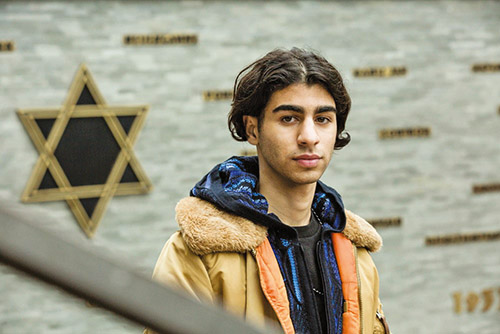


The 22nd annual Rutgers Jewish Film Festival will run this year in hybrid form November 7-21, offering five of its 15 feature films both virtually and at live showings, plus three short films and one Swiss television series.
The state’s largest Jewish film festival, which was all-virtual last year, will offer in-person showings at the Rutgers Cinema on its Livingston campus in New Brunswick and at the Princeton Garden Theatre in Princeton. All attendees must be fully vaccinated and wear a mask.
The screenings, all of which will be available virtually, include a diverse array of award-winning films from the United States, Israel, Germany and other countries. As in past years, many of the films will feature speakers, including directors, scholars and experts, who can be viewed virtually on theater screens and at home.
Although some offerings will be available virtually throughout the length of the festival, others have a limited window for viewing, according to Karen Small, managing director of the sponsoring Rutgers University Allen and Joan Bildner Center for the Study of Jewish Life and founding director of the festival, which is made possible through a gift from the Karma Foundation.
The festival’s “opening night“ will feature a showing of “Wet Dog,” a German film about an Iranian Jewish teen whose family moves to a mostly Muslim and Arab neighborhood in Berlin, where the boy is forced to hide his identity. When his true identity is exposed, he suffers the consequences. The film is based on the autobiography “Ein Nasser Hund,” by Arye Shalicar, who will appear via Zoom from his home in Israel to discuss his youthful experiences. The film will also be shown in person at Rutgers on November 13.
Another highlight is “Yerusalem: The Incredible Story of Ethiopian Jewry,” an Israeli film that will make its New Jersey premiere on November 21 in two separate showings, one of them at Rutgers. The in-person showing is co-sponsored by the New Jersey-Israel commission. “This is a wonderful documentary that tells the amazing story of the Ethiopian Jews, their coming to Israel and the impact they have had on Israel,” said Small. The movie underscores how an isolated Jewish tribe kept religious traditions and longing for a homeland alive in a hostile environment. Its director, Levi Zini, will be interviewed virtually.
The “astonishing but true story” of a Nazi officer who falls in love with a Jewish concentration camp prisoner after being captivated by her singing is told in “Love It Was Not,” an Australian and Israeli film whose director, Maya Sarfaty, will appear virtually November 14. Small said the director found archival interviews of the woman, Helena Citron, and her sister Roza, who were saved from death at Auschwitz by SS Officer Franz Wunsch, as well footage of others who knew the sisters at Auschwitz.
“The story itself is unbelievable, but the way the director weaves this archival footage into the film is impressive,” said Small. Although almost certainly Helena was coerced into the affair, Small said 30 years later she received a letter from Wunsch’s wife asking her to testify on his behalf at his war crimes trial. The film was the 2020 best
Israeli film at the Docaviv International Documentary Film Festival.
“American Birthright” outlines the journey of director Becky Tahel, who documents her global trek to engage rabbis, religious experts, mentors and family about Judaism’s perspectives on love, faith and marriage after her sister becomes engaged to a non-Jew. Tahel will appear in a prerecorded interview. “What she finds ultimately changes her life,” said Small. “Her story and what she discovers is really an American Jewish story in so many ways.”
Small said of special interest are the six episodes of the Swiss mini-series “Labyrinth of Peace,” the first three of which will be available November 7-14 and the final three November 14-21. “This is really interesting because we’re all used to Israeli TV series, but here we have one that takes up Switzerland’s role in the war,“ said Small. “This 2020 series was inspired by true events that challenge the myth of Switzerland’s neutrality during the war.” The series, set in post-World War II Switzerland, won best female and male lead actor accolades at the Swiss Television Awards. Its writer and creator, Petra Volpe, will appear virtually on November 21.
The 21-minute short film “The Tattooed Torah,” based on Marvell Ginsburg’s book of the same name, recounts the true story of the rescue and restoration of a small Czech Torah. The American film is narrated by the late Ed Asner and is recommended for youngsters in grades four to six. “It is rare we find a film that is appropriate for elementary age children so when we did, we felt we definitely needed to show it,” said Small. “It’s a great movie for children to watch with their parents or grandparents.”
The German short film “Masel Tov Cocktail,” about a Russian-Jewish teen living in Germany, won the best student film award at the Jaipur International Film Festival. A prerecorded question and answer session with its director, Arkadij Khaet, is also available. “The film follows a teen through one day as he faces antisemitism from classmates and misunderstandings about Jews and Jewish history from his teachers,” said Small. “It was one of our staff’s favorite films.”
The last short is an animated six-minute Israeli film, “Cinema Rex” about a famed 1930s Jerusalem movie theater and a Jewish boy and Arab girl who become friends over their shared discovery of the magic of film. It was the winner of the CANAL+ Youth Award at the 2020 Animated Film Festival.
Campus showings are free with a $1 booking fee, but tickets must be ordered in advance through the Rutgers cinema website, rutgerscinema.com. Princeton showings are $12.50 and $10 for seniors and must be purchased through the theater’s website, princetongardentheatre.org. Virtual tickets are $11; an all-access pass is $95. For a full listing of films, showings and speakers or to purchase virtual tickets visit
bildnercenter.rutgers.edu.













